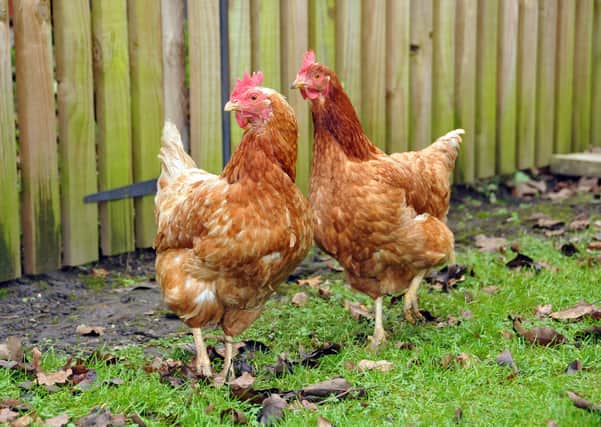New restrictions to stop spread of Avian Flu


The new housing measures build on the strengthened biosecurity regulations that are already in place.
New guidance from DEFRA states that birds must be housed where possible and bird keepers must follow strict biosecurity measures including cleansing and disinfecting all clothing, footwear and equipment that comes into contact with wild and domestic birds.
Advertisement
Hide AdAdvertisement
Hide AdThis follows new cases of Avian Flu in wild and captive birds in parts of the UK. West Sussex includes areas that are deemed higher risk areas due to the number of estuaries and wetlands used by wild birds.
Poultry owners should watch out for signs that their birds have been infected. The main symptoms of Avian Flu include a swollen head, blue discolouration of the neck and throat, loss of appetite, diarrhoea and respiratory distress (e.g. coughing and sneezing).
Peter Aston, West Sussex Trading Standards Team Manager, said: “The consequences of Avian Flu spreading to domestic birds and poultry in West Sussex would be severe. We want to remind all owners that they will need to follow this new guidance from Monday 14 December to ensure their birds avoid catching the disease.”
Deborah Urquhart, West Sussex County Council’s Cabinet Member for Environment, said: “I urge all bird and poultry keepers to follow this guidance and to ensure we prevent the spread of Avian Flu to domestic birds in West Sussex.”
Advertisement
Hide AdAdvertisement
Hide AdOwners should put in place the following biosecurity measures:
• Housing or netting all poultry and captive birds
• Cleansing and disinfecting clothing, footwear, equipment and vehicles before and after contact with poultry and captive birds – if practical, use disposable protective clothing
• Reducing the movement of people, vehicles or equipment to and from areas where poultry and captive birds are kept, to minimise contamination from manure, slurry and other products, and using effective vermin control
• Thoroughly cleaning and disinfecting housing at the end of a production cycle
Advertisement
Hide AdAdvertisement
Hide Ad• Keeping fresh disinfectant at the right concentration at all points where people should use it, such as farm entrances and before entering poultry and captive bird housing or enclosures
• Minimising direct and indirect contact between poultry and captive birds and wild birds, including making sure all feed and water is not accessible to wild birds.
The disease spreads from bird to bird by direct contact or through contaminated body fluids and faeces. It can also be spread by contaminated feed and water or by dirty vehicles, clothing and footwear.
Avian Flu is a disease which mainly affects birds but in very rare cases it can spread to people and other mammals.
Find out more online.
Advertisement
Hide AdAdvertisement
Hide AdTo subscribe to online alerts about disease status, including Avian Flu, visit online/
If you find dead wild waterfowl (swans, geese or ducks) or other dead wild birds, such as gulls or birds of prey, you should report this to the Defra helpline on 03459 33 55 77.
Poultry keepers should report suspicion of disease to APHA on 03000 200 301.